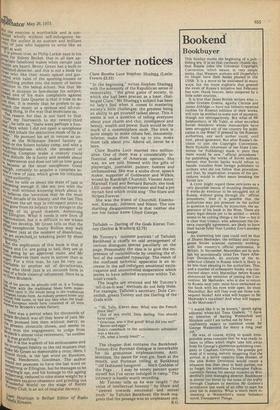Bookend
Bookbuyer
This Sunday marks the beginning of a. publishing era. It is on that curiously chosen day that Russia joins the Universal Copyright, Convention, which means, in very simple terms, that Western authors will (hopefully) no longer have their books pirated in the
USSR. It is a move to be welcomed in many ways, but the inane euphoria that greeted the news of Russia's initiative last February has now, thank heaven, been tempered by a little sober analysis.
It is true that those British writers who — unlike Graham Greene, Agatha Christie and James Aldridge — have not hitherto received roubles for Russian editions of their works, will now be entitled to some sort of payment, though not retrospectively. But what of Mr Solzhenitsyn, or Mr Yakir, or other so-called Soviet dissidents whose manuscripts have been smuggled out of the country for publi cation in the West? If pressed by the Russian authorities, any such author could, until now, plead ignorance. But after Russia's de cision to join the Copyright Convention, Boris Stukalin (chairman of her State Com mittee for Publishing) made it plain that there would be new " official procedures" for publishing the works of Soviet authors abroad; that Soviet banks would refuse to handle transfers from foreign publishers to authors who did not follow that procedure; and that, by implication, evasion of the procedures would in effect mean breaking the Soviet law.
A cynic might regard these strictures as a very plausible means of muzzling dissidents; if works do continue to be smuggled out of
Russia, without going through the ' official procedures,' then it is possible that the authorities may put pressure on the author in question to prevent, by injunction, the appearance of his book in the West. There are many legal details yet to be settled — which seems to be cutting things a bit fine — but it is clear that Unesco. who administer the Geneva copyright agreement, are likely to have their hands fuller than London Zoo's monkey keeper.
An interesting test case could well be that of Zhores Medvedev, the brilliant and coura geous Soviet scientist currently working, with his country's official permission, in Britain. In November, Macmillan are to pub
lish his provisionally titled Ten Years After Ivan Denisovich, an analysis of the intellectual climate in Russia which is likely to
be less than pleasing to the authorities. This,
and a number of subsequent books, was contracted direct with Macmillan before Russia
announced her intention of joining the Con vention. Mr Medvedev, who is due to return to Russia next year, must have embarked on the book with his eyes wide open. So must Macmillan. But will they ever see those subsequent books? And what will happen to Mr Medvedev's royalties? And what will happen to Mr Medvedev?
I would like it to be known," quoth aging editorial whizz-kid Tony Godwin, "I have no intention of leaving Weidenfeld and Nicolson until I am turfed out by force . . . I confidently expect to continue under Sir George Weidenfeld for many a long year yet." He was, of course, trying to quash irresponsible press rumours that he was ready to listen to offers which might take him away from Sir George's glamorous publishing company in Clapham. Certainly, the gossips got most of it wrong, naively imagining that the arrival, in a senior capacity from Hodder, of the able Robin Denniston would create a situation less than ideal to both parties; not to forget the ambitious Christopher Falkus, currently flexing his mental muscles as Weidenfeld's joint managing director. Bookbuyer is almost too bored by the noise of the traffic through Clapham to mention Mr Godwin's acceptance last week of an offer to start his own list in America. What is much more interesting is Weidenfeld's latest Nabokov novel, Transparent Things.


































 Previous page
Previous page